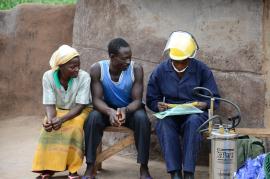Ms. Niyongira, who is a community health worker as well, enjoys participating in IRS not only because it provides income for her family, but also because it enables her to be directly involved in malaria control in her community.

A Rwandan spray operator carefully records her spray activities. Source: Erin Schiavone, Abt Associates
“Using the money I am paid during the IRS campaign, I am able to pay school fees, medical insurance, and also buy food for my family,” said Ms. Muhorakeye. As a woman and a mother, she is readily accepted and allowed to freely enter people’s houses to conduct the spraying. Ms. Niyongira, who is a community health worker as well, enjoys participating in IRS not only because it provides income for her family, but also because it enables her to be directly involved in malaria control in her community. She said, “If we had kept on thinking that women are weak and should stay at home … we would not have made the gains we have achieved as a community in the fight against malaria.”
With support from PMI, Rwanda’s NMCP is implementing IRS as one of the key strategies for malaria control. During FY 2013, more than 990,000 residents were protected against malaria. Out of a total 1,925 spray operators who participated in the IRS campaigns in FY 2013, more than half were women.
